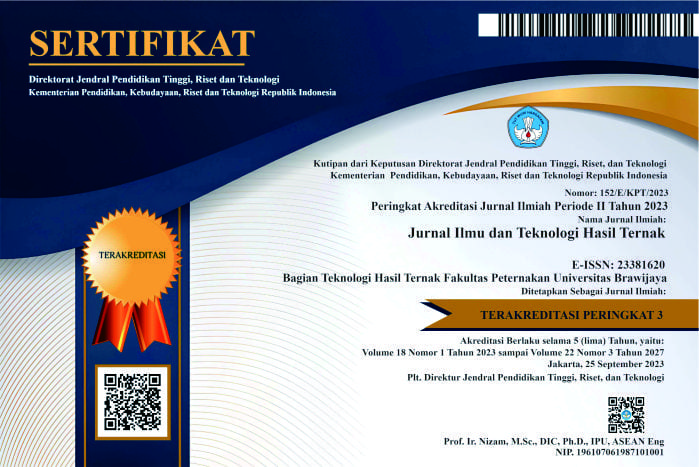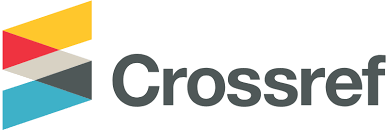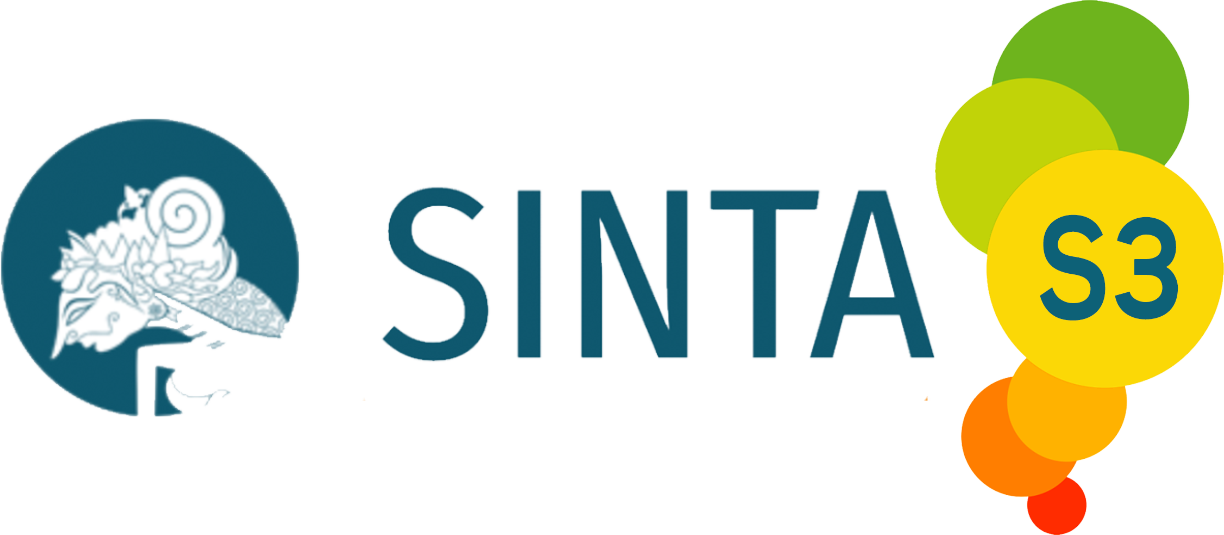Evaluasi Sifat-Sifat Kolagen Tulang Broiler pada Penerapan Kombinasi Proses Berbeda
DOI:
https://doi.org/10.21776/ub.jitek.2017.012.02.5Keywords:
Extract, Collagen, Bone, Broiler, DemineralizationAbstract
Collagen is one of the protein derivative products that can be produced by hydrolysis process. Collagen proteins found one of them in bone cattle. The protein is strongly bound to minerals in bone. The process of collagen extraction of bone requires a special method. One of them is demineralization process. The combination of several process methods allows collagen to have different properties. This study aims to evaluate the properties of collagen extract produced from broiler bone in the application of a combination of different processes. The study was used a major sample of composite bone from broiler. The main ingredient is using acetic acid (CH3COOH 1M). The applied treatment was a combination of the use of CH3COOH concentration levels (8%, 10% and 12%) with the length of process (24 and 48 hours)[B1]Â . The data were analyzed by ANOVA using the basic design of Completely Randomized Design (CRD) factorial pattern. Parameters observed included yield, gel strength, viscosity and pH. The results showed that the difference of concentration had significant effect (P<0,05) to pH and viscosity, but no significant effect (P> 0,05) to yield and gel strength. The process length had significant effect (P<0,05) to pH, but to yield, gel strength and viscosity had no significant effect (P>0,05). Application of 10% CH3COOH concentration with a 24 h process length showed better properties in collagen-based composite bone of broiler.
 [B1]Variables measured?
References
Arnesen, J.A., & Gildberg, A. (2002). Preparation and characterization of gelatin from the skin of harp seals (Phoca groendlandica). Bioresource Technology, 82, 191-194. https://doi.org/10.1016/S0960-8524(01)00164-X
Arshadi, M., Faraji, A.R., Amiri, M.J., Mehravar, & M., Gil A. (2015). Removal of methyl orange on modified ostrich bone waste–A novel organic–inorganic biocomposite. Journal of Colloid & Interface Science, 446, 11-23.
Astawan, M., Hariyadi, P., & Mulyani, A. (2002). Analisis sifat reologi gelatin darikulit ikan cucut. Jurnal Teknologi & Industri Pangan., 13(1), 38-46.
Avena-Bustillos, R.J., Olsen, C.W., Olson, D.A., Chiou, B., Yee, E., Bechtel, P.J., McHugh, L.H. (2006). Water vapor permeability of mamalian and fish gelatin films. Journal of Food Science, 71(4), 202-207. https://doi.org/10.1111/j.1750-3841.2006.00016.x
Bhat, R & Karim, A.A. (2008). Ultraviolet irradiation improves gel strength of fish gelatin. Food Chemistry, 113, 1160-1164. https://doi.org/10.1016/j.foodchem.2008.08.039
Bodirsky, B.L., Popp, A., Lotze-campen, H., Dietrich, J.P., Rolinski, S., Weindl, I., Stevanovic, M. (2014). Reactive nitrogen requirements to feed the world in 2050 and potential to mitigate nitrogen pollution. Nature Communications, 5, 3858.
doi:http://dx.doi.org/10.1038/ncomms4858
Centner, T.J. (2004). Developing institutions to encourage the use of animal wastes as production inputs. Agriculture & Human Values, 21, 367-375.
doi:http://dx.doi.org/10.1007/s10460-003-1223-5.
Giménez, B., Gómez-Guillén, M.C., & Montero, P. (2005). The role of salt washing of fish skins in chemical and rheological properties of gelatin extracted. Food Hydrocolloids, 19, 951-957.
GMIA. (2012). Gelatin Handbook. Gelatin Manufacturers Institute of America Members as of January 2012.
Junianto., K., Haetami, & Maulina, I. (2006). Produksi gelatin dari tulang ikan & pemanfaatannya sebagai bahan dasar pembuatan cangkang kapsul. Laporan Penelitian Hibah Bersaing IV Tahun I. Fakultas Perikanan & Ilmu Kelautan Universitas Padjadjaran
Kasankala, L. M., Xue, Y., Weilong, Y., Hong, S. D., & He, Q. (2007). Optimization of gelatine extraction from grass carp (Catenopharyngodon idella) fish skin by response surface methodology. Bioresource Technology, 98(17), 3338–3343. https://doi.org/10.1016/j.biortech.2006.03.019
Kementerian Pertanian RI. (2015). Statistik Peternakan. Direktorat Jenderal Peternakan & Kesehatan Hewan, Kementerian Pertanian RI, Jakarta.
Khomsatin, S. (2004). Evaluasi Perbedaan Konsentrasi Asam Klorida & Lama Perendaman Terhadap Kualitas Gelatin dari Kulit Sapi Trimming. Departemen Ilmu Produksi & Teknologi Peternakan. Fakultas Peternakan. Institut Pertanian Bogor, Bogor.
Kołodziejska, I., Kaczorowski, K., Piotrowska, B., & Sadowska, M. (2004). Modification of the properties of gelatin from skins of Baltic cod (Gadus morhua) with transglutaminase. Food Chemistry, 86(2), 203–209. https://doi.org/10.1016/j.foodchem.2003.08.036
Kołodziejska, I., Skierka, E., Sadowska, M., Kołodziejski, W., & Niecikowska, C. (2008). Effect of extracting time and temperature on yield of gelatin from different fish offal. Food Chemistry, 107(2), 700–706. https://doi.org/10.1016/j.foodchem.2007.08.071
Leiner, P.B. (2002). The Physical and Chemical Properties of Gelatin. http://www.pbgelatin.com.
Lestari, S.D. (2005). Analisis Sifat Fisika Kimia dan Rheologi Gelatin Kulit Hiu Gepeng (Alopias Sp) dengan Penambahan MgSO4, Sukrosa, dan Gliserol. Fakultas Perikanan & Ilmu Kelautan. Institut Pertanian Bogor, Bogor.
Munda, M. (2013). Pengaruh Konsentrasi Asam Asetat & Lama Demineralisasi terhadap Kuantitas & Kualitas Gelatin Tulang Ayam. Fakultas Peternakan Universitas Hasanuddin, Makassar.
Ockerman, H.W., & Hansen C.L. (2000). Animal By Product Processing & Utilization. CRC Press, USA.
Kołodziejska, I., Skierka, E., Sadowska, M., Kołodziejski, W., & Niecikowska, C. (2008). Effect of extracting time and temperature on yield of gelatin from different fish offal. Food Chemistry, 107(2), 700–706. https://doi.org/10.1016/j.foodchem.2007.08.071
Schrieber, R., & Gareis, H. (2007). Gelatine Handbook, Wiley-VCH GmbH & Co, Weinhem.
Steel, R.G.D,. & Torrie, J.H. (1991). Principle & Procedure of Statistics. 2nd .ed. International Book Company, Tokyo.
Zhang, Y., Liu, W., Li, G., Shi, B., Miao, Y., & Wu, X. (2007). Isolation and partial characterization of pepsin-soluble collagen from the skin of grass carp (Ctenopharyngodon idella). Food Chemistry, 103(3), 906–912. https://doi.org/10.1016/j.foodchem.2006.09.053
Zhang, Y., Liu, W., Li, G., Shi, B., Miao, Y., & Wu, X. (2007). Isolation and partial characterization of pepsin-soluble collagen from the skin of grass carp (Ctenopharyngodon idella). Food Chemistry, 103(3), 906–912. https://doi.org/10.1016/j.foodchem.2006.09.053.
Zhou, P & Joe, M.R. 2005. Effect of alkaline and acid pretreatments on alaska pollock skin gelatin extraction. J. Food Sci, (70), 392-396. doi:10.1111/j.1365-2621.2005.tb11435.x
Downloads
Published
Issue
Section
License
Copyright (c) 2017 Muhammad Irfan Said, Hajrawati Hajrawati, Mulyanti Munda

This work is licensed under a Creative Commons Attribution 4.0 International License.
Authors who publish with this journal agree to the following terms:
- Authors retain copyright and grant the journal right of first publication with the work simultaneously licensed under a Creative Commons Attribution License that allows others to share the work with an acknowledgement of the work's authorship and initial publication in this journal.
- Authors are able to enter into separate, additional contractual arrangements for the non-exclusive distribution of the journal's published version of the work (e.g., post it to an institutional repository or publish it in a book), with an acknowledgement of its initial publication in this journal.
- Authors are permitted and encouraged to post their work online (e.g., in institutional repositories or on their website) prior to and during the submission process, as it can lead to productive exchanges, as well as earlier and greater citation of published work (See The Effect of Open Access).















